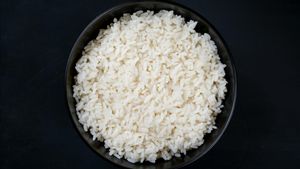JAKARTA - Recently, many people have enjoyed and followed the defecational coffee trend. They follow this trend and share it through social media. Decaf coffee is an alternative for those who are sensitive to coffee caffeine. However, is defaf coffee safe for the health of the body?
Reporting from the Healthline page, Decaf stands for caffeineless coffee. Decaf is coffee from coffee beans that have been removed by at least 97% of its caffeine.
There are many ways to get rid of caffeine from coffee beans. Most use water, organic solvents, or carbon dioxide. Coffee beans are washed in solvents until caffeine is extracted, then the solvent is removed.
Caffeine can also be removed using carbon dioxide or charcoal filters, a method known as Swiss Water Process.
Coffee beans are eliminated from caffeine before roasting and milling. The nutritional value of coffee without caffeine should be almost the same as that of ordinary coffee, in addition to its caffeine content.
SEE ALSO:
However, the taste and smell may become slightly softer, and the color may change, depending on the method used. This can make defecation coffee more delicious for those who are sensitive to the bitter taste and smell of ordinary coffee.
This coffee contains caffeine in varying quantities, typically about 3 mg per cup. One study found that every 6 ounce (180 mL) coffee cup contains 07 mg caffeine.
On the other hand, the average cup of regular coffee contains about 70140 mg of caffeine, depending on the type of coffee, the preparation method, and the size of the cup. So, although defaf coffee is not completely caffeine free, the amount of caffeine is usually very small.
Decaf coffee contains the same amount of antioxidants as regular coffee, although the amount may be lower by 15%. This difference is most likely due to the slight loss of antioxidants during the caffeine removal process.
The main antioxidants in regular coffee and caffeineless coffee are hydrokinamic acid and polyphenolic acid. Antioxidant is very effective in neutralizing reactive compounds called free radicals.
This reduces oxidative damage and can help prevent diseases such as heart disease, cancer, and type 2 diabetes. In addition to antioxidants, caffeineless coffee also contains a small amount of nutrients.
One cup of brewed caffeineless coffee provides 2.4% of the recommended daily intake of magnesium, 4.8% potassium, and 2.5% of niasine, or vitamin B3. This may not seem like much nutrition, but the number increases rapidly if you drink 23 (or more) cups of coffee per day.
Health benefits from undecafted coffee
Decaf coffee has many health benefits, which are mainly associated with antioxidants and other active substances. However, the specific health effects of defaf coffee are difficult to determine.
Drinking coffee, both regular coffee and caffeineless coffee, has been attributed to a reduced risk of type 2 diabetes. Each daily cup can reduce the risk by up to 7%. This suggests that elements other than caffeine may be responsible for this protective effect.
The effect of defaf coffee on liver function is not well studied like regular coffee. However, one large observational study attributes decaf coffee to a decrease in liver enzyme levels, which show protective effects.
Drinking caffeineless coffee is also associated with a small but significant reduction in the risk of premature death, as well as death from stroke or heart disease.
Both ordinary and defaf coffee appears to have a positive effect on age-related mental decline. Human cell studies also show that decaf coffee can protect neurons in the brain. This can help prevent the development of neurodegenerative diseases such as Alzheimer's and Parkinson's.
One study suggests this may be caused by chlorogenic acid in coffee, not caffeine. However, caffeine itself has also been associated with reduced risk of dementia and neurodegenerative disease.
One of the common side effects of drinking coffee is the heartburn or acid reflux. Many people experience this condition, and drinking decaf coffee can relieve this side effect. Decaf coffee has been shown to cause much less acid reflux than ordinary coffee.
Drinking two cups or more decaf coffee per day is also associated with a lower risk of being exposed to rectum cancer of up to 48%.
Photo: Freepik/jibekstocker
The English, Chinese, Japanese, Arabic, and French versions are automatically generated by the AI. So there may still be inaccuracies in translating, please always see Indonesian as our main language. (system supported by DigitalSiber.id)


















